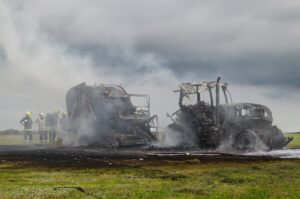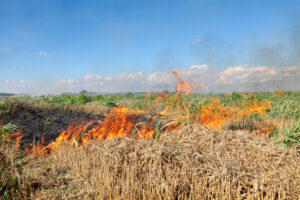New initiative launches plan to fight farm fires this harvest
4th June 2023
Fire and Rescue Services across the Thames Valley have joined forces with NFU Mutual and the NFU to launch a new six-point plan to fight farm fires this harvest.
The initiative to fight farm fires comes as farm and agricultural vehicle fires in Berkshire, Buckinghamshire and Oxfordshire cost nearly £4 million last year, according to rural insurer NFU Mutual.
The hot dry summer last year also led to a sharp rise in harvest fires, with crop fires in the three counties engulfing over 100 hectares of food crops.
Long periods of dry weather combined with temperatures reaching more than 40C made the countryside a tinderbox for combines, balers and other farm machinery.
Thames Valley Fire and Rescue Services, NFU and NFU Mutual join forces to tackle farm fires
Across the Thames Valley area, fire prevention advice and news about the onset of local high-risk weather conditions are being shared by the fire service and the NFU’s text alert network and other social media platforms.
Hannah Binns, rural affairs specialist at NFU Mutual, said: “Farm fires put the lives of people and animals at risk and lead to huge financial losses, destroyed food and damage to the environment. NFU Mutual recommend that farmers increase regular cleaning stops and consider a range of additional fire prevention measures including combine fire suppression systems to reduce fire risks in future hot summers.
“Bringing together Thames Valley Fire and Rescue Services, NFU and NFU Mutual enables us to share our expertise and quickly alert farmers to adverse weather conditions. This will help them protect their machinery and plan harvesting operations to avoid periods when there is a high risk of fire.”
Alex Nelms, NFU county chair for Berkshire, Buckinghamshire and Oxfordshire, said: “Our advice is to keep farm vehicles maintained at all times. This includes combine harvesters which should be cleared out regularly during harvest. It’s also important to keep a serviced fire extinguisher to hand.
“If the worst happens and there is a fire on farm, having an emergency plan and staff trained on what to do is really important. It also helps to have information on how to access water supplies and have a bowser filled with water, tractor, and plough ready to create a fire break if needed.”
Group manager Steve Leonard, Lead for Wildfire in the Thames Valley, said: “Thames Valley Fire and Rescue Services are proud to work with the farming community to try and reduce incidents of agricultural fires and loss of crop and equipment.
“Last year saw an increase in fires across the Thames Valley and the UK. Even though we had an unprecedented rise in temperatures last year and climate change predictions will see this issue increase in the future, we hope the advice given with NFU Mutual and the NFU will help protect farmers’ livelihoods.”

How to prevent fires on your farm
- Regular maintenance – Ensure that your equipment is clean and maintained before every harvest activity. Regular equipment blowdowns and lubrication schedules can help avoid fires within your equipment.
- Help us find you – Provide the fire and rescue service’s control centre with what3words from the entrance of your farm and wait for the first appliance. They will then ask you to guide them to the scene of the incident.
- Know where your water supplies are – Ensure that any available water supplies on your farm are accessible to fire and rescue crews. If you know where your nearest fire hydrant is, ensure that this is clear and accessible.
- Have contingency arrangements in place – Consider using cultivators to put in fire breaks where safe to do so. If you have water bowsers available to extinguish spot fires ensure that they are near and full of water.
- Store safe – Where possible avoid storing bales near main roads to deter would-be trespassers and arsonists. Store pesticides and fertilisers securely and remember it’s critical to let us know if these products are involved in a fire due to the specific risks they pose.
- Check conditions and consult the Fire Severity Index before planning harvesting activities – This will help you identify the best time of day to start your harvesting to avoid the most extreme weather zones. Also, check wind direction and where possible harvest in the direction of the already cut crop and not the unharvested crop
For more farm fire safety advice also read Upgrade Fire Precautions Ahead of Harvest

